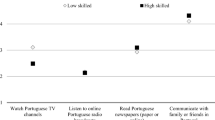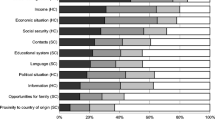Abstract
In this study, we use quantitative and qualitative data to analyze how historical events shaped skilled emigration and integration of two Eastern European groups into the USA. Some of these migrants lost all interest in their country of origin and seek to fully assimilate to the new society. Others developed a new type of identity, as global citizens rather than of a particular country. They are willing to learn and understand the new society, but at the same time, they keep in touch with the home country. These two fundamental avenues of skilled migrant integration are related to individual characteristics as well as structural forces, and may highlight potential subsequent moves, addressing the global circulation of skilled international migrants.
Similar content being viewed by others
Notes
The names of all our respondents were changed in this paper.
Highly skilled workers are defined here as persons with a university degree or equivalent experience in a given field. It includes highly skilled specialists, independent executives and senior managers, specialized technicians or tradepersons, investors, business persons, “keyworkers,” and sub-contract workers (OECD SOPEMI, 1997 apud Iredale, 2001).
In this paper, we use “Romanian” and “Hungarian” in the USA for people who were born in these countries. We do not imply that these people are currently citizens of Romania or Hungary.
In 2008, Hungary signed an agreement with the USA allowing its citizens to travel without a visitor visa starting with 2009. Romanian citizens are still required to get a visa before traveling to the USA.
Although the University of Bucharest, where the prime minister got his PhD, officially concluded that the Prime Minister thesis was plagiarized, he kept his title due to a law proposed and passed by the opposition party in 2011. After the scandal, the party led by the Prime Minister was voted overwhelmingly in both local and general elections.
Her position as a faculty was kept for her and she was not fired until she finished her PhD.
References
Ad-Astra. (2008) Scrisoare deschisă către cercetătorii români din străinătate pentru promovarea oportunităţilor de reintegrare profesională în ţară[ Open letter toward Romanian researchers working abroad. Opportunities for professional development in Romani], http://www.ad-astra.ro/events/14/ (retrieved April 10, 2012)
Agentia pentru strategii guvernamentale (2007) Comunitatea romaneasca in Italia: conditii sociale, valori, asteptari [Romanian community in Italy: social conditions, values, hopes], Agentia pentru strategii guvernamentale, Romania
Berényi Dénes (1993) ‘Az „agy-elvonás” pozitív megközelítésben’, [A positive approach to the brain drain] Magyar Tudomány , 9.
Bollag, Burton ( 1999) ‘Reforms in higher education disappoint Eastern Europeans’, The Chronicle of Higher Education 46,15 A55, December
Borjas, G. J. (1992). Ethnic Capital and Intergenerational Mobility. Quarterly Journal of Economics, 107, 428.
Borjas, G. J. (1994). Long-run Convergence of Ethnic Skills Differentials: the Children and Grandchildren of the Great Migration. Industrial & Labor Relations Review, 47, 4.
Boyd, M. (1989). Family and personal networks in international migration: recent developments and new agendas. International Migration Review, 23, 2.
Bradatan, C. (2006) ‘More than just academic’, Transitions online, September
Bukody, Erzsebet (2004) Social Report 2003. (Budapest, Central Statistical Office)
Csanády, M.T., Kmetty,Z., Kucsera, T., Személyi, L. and Tarján, G. (2008) ‘A magyar képzett imgráció a rendszerváltás óta’ [The skilled Hungarian emigration since the regime change.] Magyar Tudomány 2008.5. Favell, Adrian. (2003) ‘Eurostars and Eurocities: Towards a Sociology of Free Moving Professionals in Western Europe’, working paper, The Center for Comparative Immigration Studies, University of California, San Diego
Favell, A. (2003). Games without Frontiers? Questioning the Transnational Social Power of Migrants in Europe. European Journal of Sociology, 44(3), 397–427.
Florian, R. (2004). ‘Migratia cercetatorilor romani: Situatia actuala, cauze, solutii’ [ Romanian Researchers Migration: Current Situation, Causes, Solutions]. Revista Ad- Astra, 3, 2.
Gates, Bill (2008) Written Testimony of William H. Gates Chairman, Microsoft Corporation and Co-Chair, Bill& Melinda Gates Foundation before the Committee on Science and Technology United State House of Representatives, March 12.
Gurak, D. T. & Caces, F. (1992). Migration Networks and the Shaping of Migration Systems. In M. M. Kritz, L. L. Lim, & H. Zlotnik (Eds.), International Migration Systems. A Global Approach. New York: Oxford University Press.
Giosan, L. and Oprea, T.I. (2002) ‘Stiinta in Romania postcomunista. Viitorul nu este luminous’ [ Science in Romania. No Glamorous Future], Revista Ad- Astra 1, 2.
Grieco, Elizabeth M, Yesenia D. Acosta, G. Patricia de la Cruz, Christine Gambino, Thomas Gryn, Luke J. Larsen, Edward N. Trevelyan, and Nathan P. Walters (2012) The Foreign-Born Population in the United States: 2010. American Community Survey Reports, US Census Bureau, retrieved on January 30, 2013 from http://www.census.gov/prod/2012pubs/acs-19.pdf
Huisman, J., de Weert, E., & Bartelse, J. (2002). Academic Careers from a European Perspective: The Declining Desirability of the Faculty Position. Journal of Higher Education, 73, 1.
Iredale, R. (2001). The Migration of Professionals: Theories and Typologies. International Migration, 39, 5.
Kaushal, Neeraj and Fix, Michael (2006) ‘The Contribution of High-Skilled Immigrants’, Migration Policy Institute (www.migrationpolicy.org)
Massey, D., Arango, J., Hugo, G., Kouaci, A., Pellegrino, A., & Taylor, E. (1993). Theories of International Migration: A Review and Appraisal. Population and Development Review, 19, 431–446.
Miłosz, Czesław (1990 [1953]) Zniewolony umysł [The Captive Mind], Vintage
NSF/NIH/USED/NEH/USDA/NASA. (2006) 2005, 2006 Survey of Earned Doctorates
Portes, Alejandro (1997) ‘Immigration theory for a new century: Some problems and opportunities’, International Migration Review 31.
Szalai, Anna (2008) ‘Elvándorló diplomások’[Outmigrating graduates)], Népszabadság, April 28
Schiermeier, Quirin (2006) “Hungary’s science academy slammed as obsolete” Nature, 441, June 29
United States Senate (2006) U.S. Visa Policy: Competition for International Scholars, Scientists and Skilled Workers, Hearing before the Subcommittee on Immigration, Border Security and Citizenship of the Committee on the Judiciary, United States Senate, One Hundred Ninth Congress, Second Session, August 31, 2006, Serial No. J-109-105
Waldinger, R., & Fizgerald, D. (2004). Transnationalism in Question. The American Journal of Sociology, 109, 5.
Zheng, Z., & Xie, Y. (2004). Asian-Americans’ Earnings Disadvantaged Reexamined: the Role of Place of Education. The American Journal of Sociology, 109, 5.
Author information
Authors and Affiliations
Corresponding author
Rights and permissions
About this article
Cite this article
Brǎdǎţan, C., Kulcsár, L.J. When the Educated Leave the East: Romanian and Hungarian Skilled Immigration to the USA. Int. Migration & Integration 15, 509–524 (2014). https://doi.org/10.1007/s12134-013-0281-9
Published:
Issue Date:
DOI: https://doi.org/10.1007/s12134-013-0281-9




